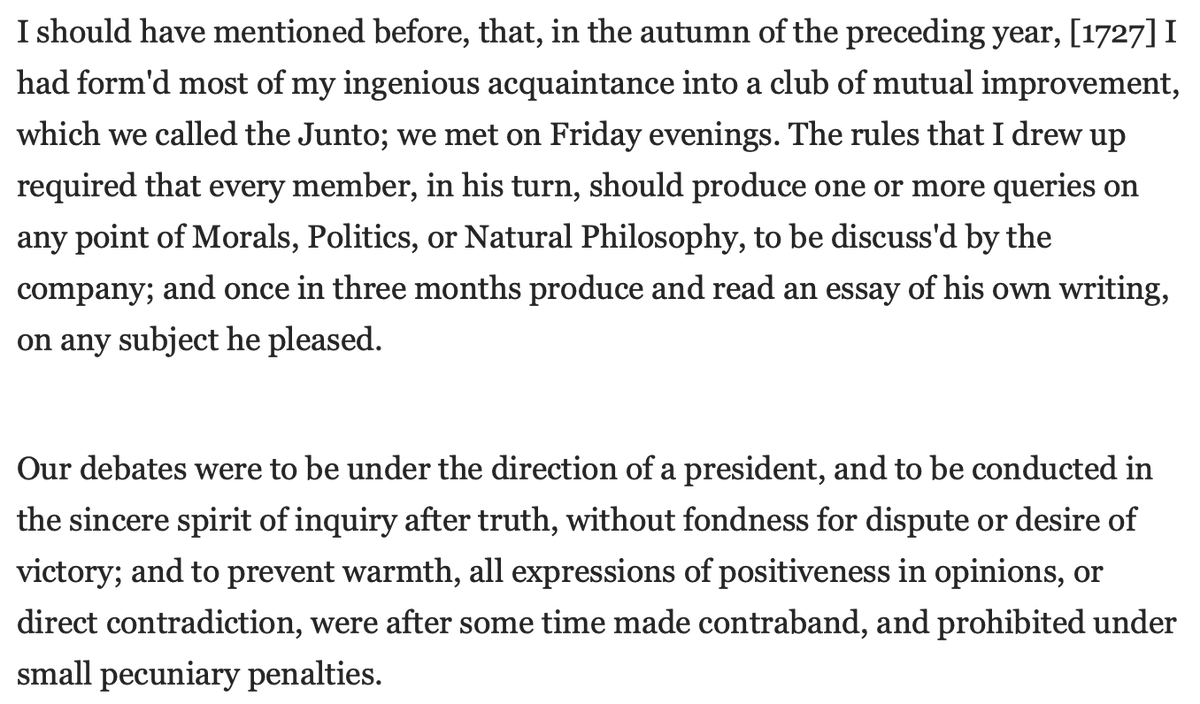
Been learning about Ben Franklin’s organization and enjoyment of small discussion groups. Some call these “salons” but Franklin called his the Leather Apron Club, or Junto. He formalized it in 1727 in Philadelphia for the goal of mutual improvement.
From his autobiography:
From his autobiography:

The group was originally twelve strong and drew from diverse occupations and backgrounds. Every Friday they’d gather to discuss morality, politics, philosophy, science, and business. And every three months, each member was required to share an essay on any topic of his choosing.
The rules were simple: intellectual honesty and humility, a generous interpretation of others' ideas, and a response that encouraged. (Sounds like Twitter, eh?)
Here were the questions that sparked conversation:
Here were the questions that sparked conversation:
1) Have you met with any thing in the author you last read, remarkable, or suitable to be communicated to the Junto? Particularly in history, morality, poetry, physics, travels, mechanic arts, or other parts of knowledge?
2) What new story have you lately heard agreeable for telling in conversation?
3) Has any citizen in your knowledge failed in his business lately, and what have you heard of the cause?
4) Have you lately heard of any citizen's thriving well, and by what means?
3) Has any citizen in your knowledge failed in his business lately, and what have you heard of the cause?
4) Have you lately heard of any citizen's thriving well, and by what means?
5) Have you lately heard how any present rich man, here or elsewhere, got his estate?
6) Do you know of any fellow citizen, who has lately done a worthy action, deserving praise and imitation? Or who has committed an error proper for us to be warned against and avoid?
6) Do you know of any fellow citizen, who has lately done a worthy action, deserving praise and imitation? Or who has committed an error proper for us to be warned against and avoid?
7) What unhappy effects of intemperance have you lately observed or heard? Of imprudence? Of passion? Or of any other vice or folly?
8) What happy effects of temperance? Of prudence? Of moderation? Or of any other virtue?
8) What happy effects of temperance? Of prudence? Of moderation? Or of any other virtue?
9) Have you or any of your acquaintance been lately sick or wounded? If so, what remedies were used, and what were their effects?
10) Who do you know that are shortly going on voyages or journeys, if one should have occasion to send by them?
10) Who do you know that are shortly going on voyages or journeys, if one should have occasion to send by them?
11) Do you think of any thing at present, in which the Junto may be serviceable to mankind? To their country, to their friends, or to themselves?
12) Hath any deserving stranger arrived in town since last meeting, that you heard of? And what have you heard or observed of his character or merits? and whether think you, it lies in the power of the Junto to oblige him, or encourage him as he deserves?
13) Do you know of any deserving young beginner lately set up, whom it lies in the power of the Junto any way to encourage?
14) Have you lately observed any defect in the laws, of which it would be proper to move the legislature an amendment? Or do you know of any beneficial law that is wanting?
15) Have you lately observed any encroachment on the just liberties of the people?
15) Have you lately observed any encroachment on the just liberties of the people?
16) Hath any body attacked your reputation lately? And what can the Junto do towards securing it?
17) Is there any man whose friendship you want, and which the Junto, or any of them, can procure for you?
17) Is there any man whose friendship you want, and which the Junto, or any of them, can procure for you?
18) Have you lately heard any member's character attacked, and how have you defended it?
19) Hath any man injured you, from whom it is in the power of the Junto to procure redress?
20) In what manner can the Junto, or any of them, assist you in any of your honorable designs?
19) Hath any man injured you, from whom it is in the power of the Junto to procure redress?
20) In what manner can the Junto, or any of them, assist you in any of your honorable designs?
21) Have you any weighty affair in hand, in which you think the advice of the Junto may be of service?
22) What benefits have you lately received from any man not present?
22) What benefits have you lately received from any man not present?
23) Is there any difficulty in matters of opinion, of justice, and injustice, which you would gladly have discussed at this time?
24) Do you see any thing amiss in the present customs or proceedings of the Junto, which might be amended?
24) Do you see any thing amiss in the present customs or proceedings of the Junto, which might be amended?
Out of the meetings came proposals for the creation of the first lending library, the Union Fire Company, the University of Pennsylvania, volunteer militia, and Pennsylvania Hospital, among many other public projects.
Imagine the individual benefits and benefits to society of finding a small group of highly trusted friends from diverse backgrounds dedicated to self-exploration, mutual improvement, and generosity? Something worth pondering.
Happy Junto-ing.
/fin
Happy Junto-ing.
/fin
• • •
Missing some Tweet in this thread? You can try to
force a refresh








